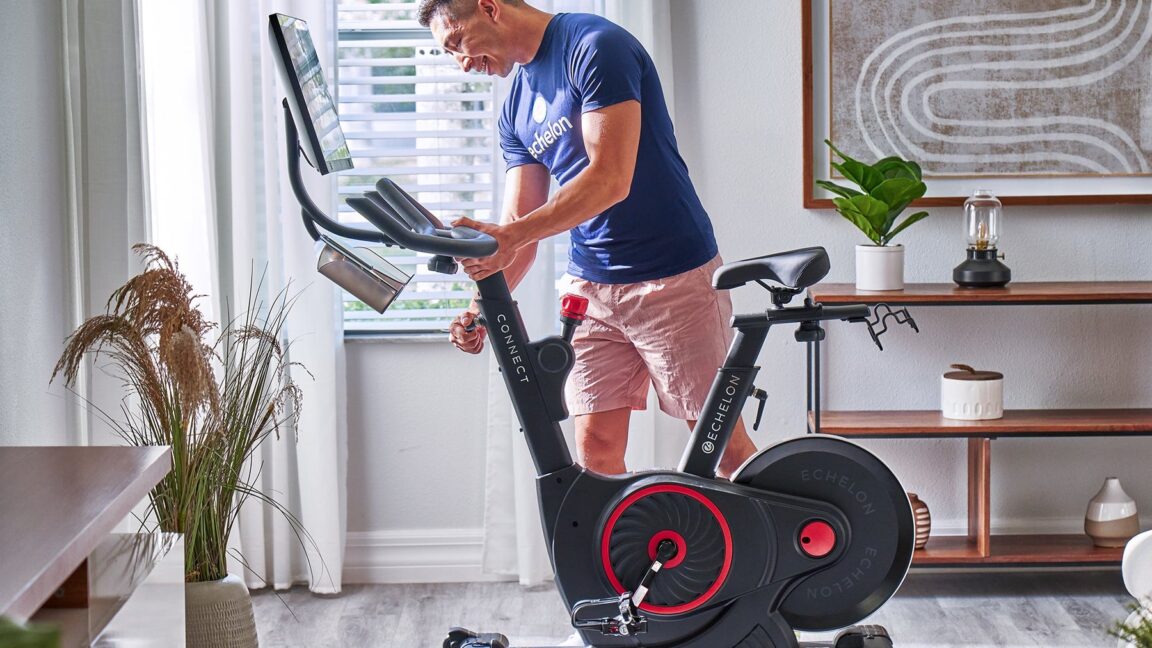
Credit: Echelon
A firmware update has killed key functionality for Echelon smart home gym equipment that isn't connected to the Internet.
As explained in a Tuesday blog post by Roberto Viola, who develops the "QZ (qdomyos-zwift)" app that connects Echelon machines to third-party fitness platforms, like Peloton, Strava, and Apple HealthKit, the firmware update forces Echelon machines to connect to Echelon’s servers in order to work properly. A user online reported that as a result of updating his machine, it is no longer syncing with apps like QZ, and he is unable to view his machine's exercise metrics in the Echelon app without an Internet connection.
Affected Echelon machines reportedly only have full functionality, including the ability to share real-time metrics, if a user has the Echelon app active and if the machine is able to reach Echelon’s servers. Viola wrote:
- On startup, the device must log in to Echelon’s servers.
- The server sends back a temporary, rotating unlock key.
- Without this handshake, the device is completely bricked—no manual workout, no Bluetooth pairing, no nothing.
Because updated Echelon machines now require a connection to Echelon servers for some basic functionality, users are unable to use their equipment and understand, for example, how fast they're going without an Internet connection. If Echelon were to ever go out of business, the gym equipment would, essentially, get bricked.
Viola told Ars Technica that he first started hearing about problems with QZ, which launched in 2020, at the end of 2024 from treadmill owners. He said a firmware update appears to have rolled out this month on Echelon bikes that bricks QZ functionality. Echelon didn’t respond to Ars Technica’s request for comment.
In his blog, Viola urged Echelon to let its machines send encrypted data to another device, like a phone or a tablet, without the Internet. He wrote:
Users bought the bike; they should be allowed to use it with or without Echelon’s services.
Echelon is in hardware, software, and subscription sales, which makes independently running equipment and apps like QZ potential threats. Yet, it's still vexing to see another example of a company changing the capabilities of its products after people already bought them. Not all Echelon owners use QZ, but many owners may be impacted when the machines lose key functionality if offline.
Some might never have purchased Echelon equipment if they knew the machines might one day fail to work without a web connection or Echelon account.
Third-party app connections severed
For some owners of Echelon equipment, QZ, which is currently rated as the No. 9 sports app on Apple's App Store, has been central to their workouts. QZ connects the equipment to platforms like Zwift, which shows people virtual, scenic worlds while they’re exercising. It has also enabled new features for some machines, like automatic resistance adjustments. Because of this, Viola argued in his blog that QZ has "helped companies grow."
“A large reason I got the [E]chelon was because of your app and I have put thousands of miles on the bike since 2021,” a Reddit user told the developer on the social media platform on Wednesday.
However, Echelon’s firmware update likely seeks to regain some of the revenue opportunities that overlap with the capabilities that apps like QZ enable. Echelon's subscription-based app, which starts at $40 per month, also offers "guided scenic rides,” for example. QZ can allow people to watch Peloton classes from their Echelon device, but Echelon sells its own fitness classes. The Tennessee-headquartered company has been investing in ways to get customers more engaged with its personalized workout platform, too, which requires the machines to be online.
There’s also value in customer data. Getting more customers to exercise with its app means Echelon may gather more data for things like feature development and marketing.
Echelon is a private company, and we don’t know how much money it is making, but it’s likely that its financial goals hinge on subscription sales, which can generate more revenue than expensive equipment purchases. Meanwhile, Echelon is competing with other tech-centric companies offering gym equipment and classes, like the Peloton.
Viola runs QZ, which costs $7 to $8 to download, alone, offering users a lot of support via online communities. He told Ars that revenue from app purchases covers his costs “more or less.”
"It was never my intention to damage anyone’s business. This is just competition. The best product should prevail," Viola said. "I never created QZ to get rich; I just wanted users to have a great hour of fitness when they choose, without connection issues, subscriptions, or [other limitations]."
In terms of QZ, the user community is “working on a fully open-source Echelon controller to unlock bikes that have already received this update,” per Viola. It’s in the very early stages, he said.

-
 C114 Communication Network
C114 Communication Network -
 Communication Home
Communication Home


